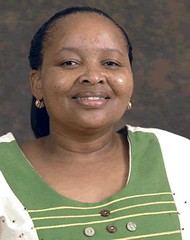
South African Minister of Land Affairs, Ms. Lulama Xingwana, who faces the monumental task of redistribution in the former apartheid state.
Originally uploaded by Pan-African News Wire File Photos
Carol Hills
Johannesburg, South Africa
27 March 2008 01:04
The Southern African Development Community (SADC) needs to urgently tackle land issues to foster regional stability and promote sustainable economic growth, Agriculture and Land Affairs Minister Lulu Xingwana said on Thursday.
"For us to achieve the goal of land reform, we will require a major new effort to build capacity, both at national and regional levels," she said.
Xingwana was addressing SADC ministers responsible for land at a meeting in Sandton.
"In the SADC region, land is a key production resource for 70% of the rural-based population who depend on agriculture and utilise natural resources for income and livelihood," said Xingwana.
"Therefore access to land becomes very crucial for the rural poor to enable them to participate in economic activities that lead to poverty reduction."
The ministers are meeting to discuss the implementation of a regional land-reform facility.
"My expectation is that when the facility is fully established and well-resourced, it will provide access to advice, expertise, training and technical support on different aspects of land reform to member states," said Zambia's Agriculture Minister, Bradford Machila, who chaired the talks.
"It will provide a mechanism for pooling donor resources for regional programmes or individual country projects.
"While acknowledging the sovereignty and national nature of land issues, the regional approach provides for development of consensus and common stands on matters leading to land reform in the region," he said.
Machila said there have been "marked improvements" in collaboration and networking since work on the facility started in 2006.
The facility is also collaborating with other institutions, such as the World Bank Institute, the Southern Africa Research Poverty Network and the Human Science Research Council.
"Land is arguably the most important asset that can be made available to the poor," he said.
Improving equitable distribution and tenure security of this resource through reforms may ensure access to land for the poor, particularly the poor women and other vulnerable groups.
"Secure tenure is an important vehicle for increasing the productivity of land and in enabling the poor to utilise their land for investment and collateral."
Machila said the Regional Indicative Strategic Development Plan adopted in 2003 identifies a need for deeper regional integration and poverty reduction through a number of intervention areas -- all of which have land at their core.
"... Therefore, it is imperative that greater efforts are made in addressing the existing land problems that have the potential to disrupt the social and economic development of this region, if not attended to," he said. -- Sapa
No comments:
Post a Comment